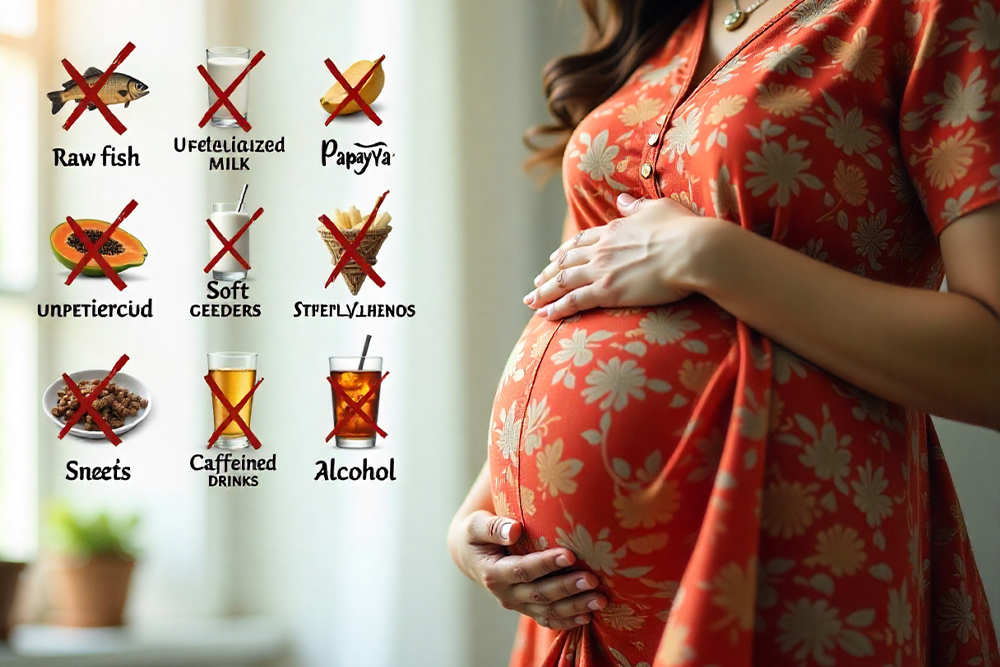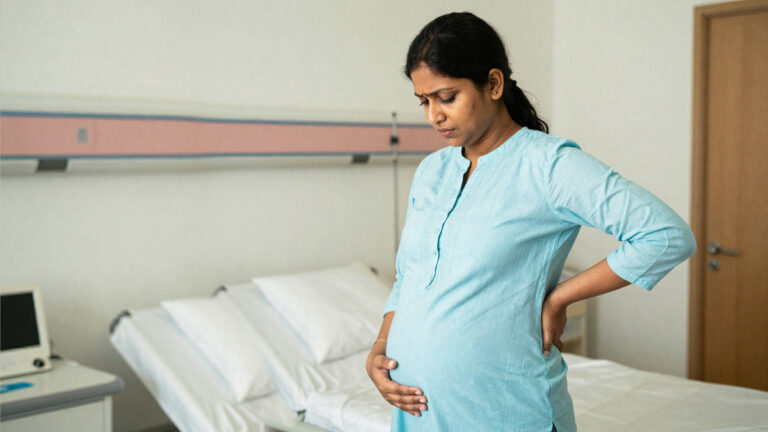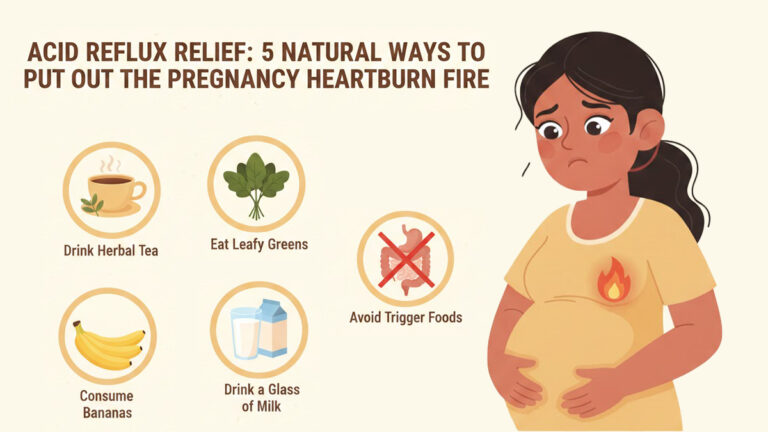Pregnancy is a beautiful journey, but it requires extra care, especially when it comes to diet. The foods you eat directly affect your baby’s growth and development as well as your own health. While eating nutritious foods is essential, certain items can be harmful due to bacteria, toxins, heavy metals, or excessive fat and sugar. Consuming these foods may increase the risk of complications such as infections, miscarriage, or gestational diabetes. Understanding which foods to avoid and following safe dietary practices can help ensure a smooth and healthy pregnancy.
1️⃣ High-Risk Foods (Raw / Undercooked / Infection-Prone)
Some foods can carry dangerous bacteria or parasites, and pregnant women are more susceptible to infections:
- Raw or undercooked meat, fish, and poultry – Items like sushi, rare steak, or undercooked chicken can carry Salmonella or Toxoplasma, which can harm both mother and baby.
- Raw eggs – Found in homemade desserts, cold sauces, or mayonnaise; may cause Salmonella infection.
- Raw sprouts – Alfalfa, mung bean, and other sprouts may contain harmful bacteria.
- Unpasteurized milk & soft cheeses – Can harbor Listeria, which may lead to miscarriage or serious infection.
- Street food, raw salads, or unwashed vegetables – Often prepared in unhygienic conditions; these can carry harmful bacteria.
Tip: Always prefer freshly cooked meals at home and ensure vegetables and fruits are washed thoroughly.
2️⃣ Foods with Chemical / Toxin or Over-Nutrition Risk
Some foods can harm your baby due to toxins, heavy metals, or excess sugar and fat:
- High-mercury fish – Shark, swordfish, king mackerel, and some tuna may affect fetal brain development.
- Excess caffeine – Coffee, strong tea, or energy drinks can reduce birth weight and increase miscarriage risk.
- Alcohol – Unsafe at any level; can lead to fetal alcohol spectrum disorders.
- Highly processed or junk foods – Fried snacks, chips, and sweets may cause gestational diabetes, unhealthy weight gain, and heartburn.
Tip: Choose low-mercury fish, fresh fruits, and natural snacks instead of processed or fried foods.
3️⃣ Indian / Traditional Foods Requiring Caution
Certain traditional or cultural foods can be risky if consumed in large quantities:
- Unripe papaya – Can trigger uterine contractions; ripe papaya is safe in moderation.
- Pineapple – Contains bromelain, which may soften the cervix; safe in small amounts.
- Fenugreek seeds (methi) – Large amounts may stimulate the uterus; moderate use in cooking is safe.
- Spicy pickles or very oily fried snacks – Can lead to acidity, indigestion, and weight gain.
Tip: Enjoy these foods occasionally and in moderation.
4️⃣ Safe Practices & Alternatives
Maintaining a healthy diet is crucial for a safe pregnancy. Consider these practices:
- Cook all meat, fish, and eggs thoroughly.
- Wash fruits and vegetables properly before eating.
- Prefer home-cooked meals over street food.
- Drink boiled or filtered water, coconut water, or doctor-approved herbal drinks.
- Include protein in every meal: dal, paneer, eggs, chicken, or fish.
- Eat whole grains like brown rice, millets, and whole wheat roti.
- Snack on fruits, nuts, and yogurt.
- Use spices moderately to prevent heartburn or acidity.
- Avoid excessive sugar and fried foods.
5️⃣ Fertility / IVF Considerations
Nutrition plays an especially important role for women trying to conceive or undergoing IVF treatment. Proper diet supports embryo implantation, early fetal growth, and overall maternal health. Avoiding foods that carry bacteria, toxins, or chemicals can significantly improve pregnancy success rates and reduce the risk of complications.
6️⃣ Myths vs Facts
Myth: “Eat for two.”
Fact: Focus on quality, not quantity.
Myth: “All spices are harmful.”
Fact: Moderate spices are safe; avoid overly oily or spicy foods causing heartburn.
Myth: “Papaya always causes miscarriage.”
Fact: Only unripe papaya in excess is risky; ripe papaya in moderation is safe.
Myth: “Herbal teas are always safe.”
Fact: Some herbs may stimulate the uterus; always consult your doctor.
7️⃣ Quick Tips for a Healthy Pregnancy Diet
- Eat small frequent meals.
- Include protein in every meal (dal, paneer, eggs, chicken, fish).
- Prefer whole grains: brown rice, millets, whole wheat roti.
- Snack on fruits, nuts, and yogurt.
- Stay hydrated throughout the day.
- Maintain hygiene: wash hands, wash vegetables/fruits, store food properly.
- Avoid processed, fried, and sugary foods as much as possible.
- Listen to your body – if a food causes discomfort, avoid it.








